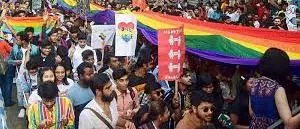
No interference warranted: SC rejects review plea on same-sex marriage
text_fieldsRepresentational image
New Delhi: The Supreme Court dismissed petitions on Thursday seeking revision of its October 17, 2023 verdict that denied a prayer to extend legal recognition to same-sex marriages.
A five-judge bench comprising Justices BR Gavai, Surya Kant, BV Nagarathna, PS Narasimha, and Dipankar Datta heard petitions in the chamber and found no mistake on the face of the record in the majority position penned by Justice (retired) S Ravindra Bhat in the 2023 verdict.
Citing "institutional limitations," a five-judge bench comprising then Chief Justice of India DY Chandrachud, Justices Sanjay Kishan Kaul, S Ravindra Bhat, Hima Kohli, and PS Narasimha declined to strike down or tweak provisions of the Special Marriage Act, 1954 (SMA), stating there was "no unqualified right" to marriage and same-sex couples could not claim it as a fundamental right under the Constitution, Indian Express reported.
The bench rejected the request to extend legal recognition to same-sex marriage, leaving it to Parliament to amend the law to approve such a relationship.
On Thursday, the bench rejected pleas to review the verdict, saying, “We have carefully gone through the judgments delivered by Hon’ble Mr S Ravindra Bhat (Former Judge) speaking for himself and for Hon’ble Ms Justice Hima Kohli (Former Judge) as well as the concurring opinion expressed by one of us (Hon’ble Mr Justice Pamidighantam Sri Narasimha), constituting majority view. We do not find any error apparent on the face of the record. We further find that the view expressed in both judgments is in accordance with the law and as such, no interference is warranted. Accordingly, the review petitions are dismissed.”
The then-CJI Chandrachud and Justice (now retired) Kaul, who were members of the five-judge bench, spoke in favour of a civil union in the 2023 verdict, but they were in the minority.
CJI Chandrachud stated that the right to a civil union or to engage in an abiding cohabitational relationship may be traced back to Part III of the Constitution, putting the State under a positive obligation to recognise it.
While acknowledging that there is no fundamental right to marry, CJI Chandrachud also stated, “There is a right or freedom to enter into a union” as laid down in various judgments of the court – Navtej Johar, K S Puttaswamy, NALSA, Shakti Vahini, Shafin Jahan etc – “and that having regard to our constitutional values, which entail respect to the choice of a person whether or when to enter into marriage and the right to choose a marital partner”.
According to the review petitions filed against the judgement, the majority verdict contained "errors apparent on the face of the record" and was "self-contradictory and manifestly unjust."
It argued that the majority judgement was incorrect because, while it determined that the respondents (authorities) were infringing the petitioners' fundamental rights via discrimination, it failed to enjoin the discrimination.
The petitioners contended that “the majority judgment overlooks that marriage, at its core, is an enforceable social contract. The right to so contract is available to anyone capable of consenting. Adults of any faith or no faith may engage in it. No one group of people may define for another what marriage means. No contract, nor forceful State action like imprisonment, may curtail an adult’s fundamental right to marry”.
The petitioners said the judgment “warrants review because it summarily disregards” what was said by the court in earlier decisions “to make the chilling declaration that the Constitution of India guarantees no fundamental right to marry or form a civil union”.
The judgment, they argued, “effectively compels young queer Indians to remain in the closet and lead dishonest lives if they wish the joys of a real family. It is fallacious that, under these facts, and in the absence of a fundamental right to marry or form a union, the rights to equal protection, dignity and fraternity are insufficient to justify judicial intervention”.























